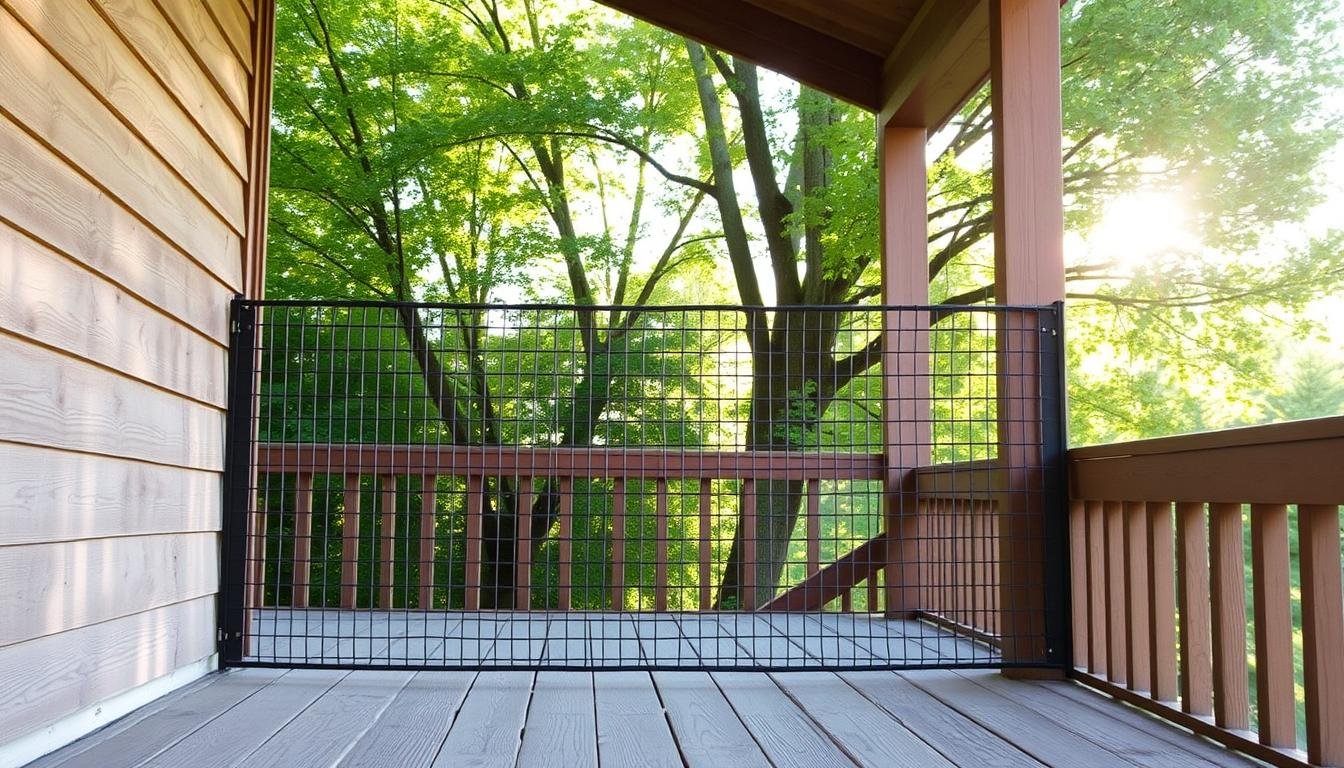Making your porch chipmunk-free can make being outside more enjoyable. Chipmunks gather various foods like nuts, seeds, and bulbs. This can be bothersome. It’s important to know how to get rid of chipmunks under porch. Using chipmunk control solutions is key to keeping a calm outdoor area.
If you see small, deep holes, damaged veggies, or bulbs pulled out of the ground, chipmunks might be at fault. Thunderstorms scare them away but only for a short time. For a lasting solution, options like hot cayenne, garlic, or coffee grounds work well. Knowing different strategies is important.
Keep reading to learn how to prevent chipmunks on porch. This can help keep your outdoor space peaceful and free of chipmunks.
Key Takeaways
- Chipmunks can hurt plants, bulbs, and buildings. Spotting the signs early matters a lot.
- There’s a wide range of chipmunk control, from natural repellents to tech devices.
- Coffee grounds not only keep chipmunks away but also help plants that love acid.
- After it rains, put repellents like peppermint or apple cider vinegar back on for continued protection.
- The cost for professional wildlife removal usually falls between $189 and $573.
Understanding the Chipmunk Problem
Chipmunks are often seen in forests but now live in cities too. They like areas around stone walls, under walkways, and gardens. Their burrowing and foraging behavior can ruin gardens. They love seeds and plant bulbs, leading to uprooted bulbs and harmed ornamental plants.
To spot a chipmunk problem, look for their habits. They make small holes and tunnels underground. Yet, these burrows haven’t been shown to damage buildings. But some companies will still charge to remove chipmunks they wrongfully blame for such harm.
There are ways to lessen chipmunk damage. An L-shaped footer stops them from burrowing near buildings and walls. Also, gravel borders without plants can keep them away from certain spots. Using caged bulbs or screens can protect your flower bulbs. Plus, squirrel repellents might work on chipmunks, even though none are made just for them.
Knowing how chipmunks behave is key to handling the damage they can cause in gardens. This knowledge helps keep your outdoor area looking good.
Potential Risks of Chipmunks
Despite their small size and cute looks, chipmunks can cause big problems for your property. These issues need quick action. Main concerns include damage to buildings and gardens from their gnawing. They chew on wood, insulation, plastic, and even wiring, which can be a hazard.
Chipmunks in your garden can also make heating and cooling cost more. They wreck insulation and other important materials. Their burrows can weaken patios and foundations, posing health dangers. Chipmunks carry pests like mites, ticks, and fleas, which can lead to other infestations.
They can spread diseases like plague, salmonella, and hantavirus. These health risks matter a lot, especially for homes with kids or pets. Chipmunks might also get into homes, raising the chance of damage and illness.
To lower these risks, check your home for any gaps or cracks often. Keep trees and bushes trimmed away from your house. Fix leaking gutters to prevent soft wood, which chipmunks can easily chew through. Most chipmunk damage costs under $200 to fix, but stopping problems early can save money and stress.
Effective Prevention Strategies
To keep chipmunks away, it’s vital to use kind and effective methods. Adding mesh wire fences can block their entry to gardens and home bases. Their burrows can be wide and deep, which may cause problems if not handled.
Try natural ways to keep them at bay, like peppermint, garlic, and spicy cayenne pepper. Spread these around your yard often, especially when it rains. Yet, remember that there aren’t any chipmunk-specific repellents sold, but those for squirrels usually work too.
Using these strategies offers a full plan against chipmunk issues. By choosing natural and physical barriers, your place stays safe for everyone. Always apply these methods regularly and inspect your property to keep chipmunks in check.
Trapping and Removal Methods
If chipmunks are causing issues around your porch or yard, trapping might be needed. To trap chipmunks, use live traps with seeds, fruits, or other tasty foods. Place these traps near their burrows to catch them better.
It’s important to follow local wildlife rules when removing chipmunks. Using humane methods is good for all animals and keeps your conscience clear.
Ultrasonic repellents and other tools can help get rid of chipmunks. They produce sounds that only small rodents hear. You can also use bucket traps, but they need to be the right size to work.
Avoid using poison or mothballs as they can be dangerous to kids and pets. Live traps are a safer and kinder option for controlling chipmunks.
If you’re dealing with lots of chipmunks, think about hiring a professional. They can remove chipmunks humanely and help stop more from coming. This service might cost more, though.
Chipmunks are mostly active in daylight, making them easier to spot and manage. By trapping, removing them kindly, and maintaining your space, you can lessen their visits.
Natural Repellents for Chipmunks
Dealing with unwanted chipmunks around your porch and garden? Natural chipmunk repellents are eco-friendly and effective. They’re not just for chipmunk control. They also help your garden. Here are some easy and natural ways to keep chipmunks away:
Cayenne pepper is a great choice to keep chipmunks away. You can sprinkle it around your garden beds. Or mix it with water to spray around. Another good repellent is peppermint oil. But, you’ll need to apply it many times a day. It keeps its strength best this way. Peppermint oil’s strong scent blocks the chipmunk’s sense of smell.
Coffee grounds are good for both your plants and keeping chipmunks away. Just spread them around your plants. You can also use human hair clippings. Chipmunks avoid places that smell like humans.
Table salt is another chipmunk irritant but won’t harm your plants. Clove or cinnamon essential oils are good too. But, you need to reapply them often. They need to stay strong, especially after rain or wind.
Using these natural methods will repel chipmunks and make your garden better. By adding these to your garden care, you’ll keep chipmunks away safely and sustainably.
Poisonous Alternatives: A Cautionary Note
It might seem easy to use poison on chipmunks, but it’s risky. Be aware of the big dangers of chipmunk poison.
The risks of using poison go beyond just killing chipmunks. It can harm other animals, pollute the land and water, and be a danger to pets and helpful garden creatures.
It’s important to know these risks. Here’s what toxic repellents can do:
| Risk | Impact |
|---|---|
| Environmental Pollution | Poisons can contaminate soil and water, leading to long-term ecological damage. |
| Non-Target Wildlife | Other animals, including pets, can ingest poison, experiencing severe health issues or death. |
| Human Health | Poisons can pose health risks, particularly to children who may come into contact with poisoned areas. |
Instead of using poison, think about safe alternatives for your garden. By choosing non-lethal methods, you help other wildlife and support a healthier ecosystem.
Long-term Maintenance Tips
To keep your yard free of chipmunks, staying consistent is crucial. Start by getting rid of debris like leaves, wood, or compost. These can hide chipmunks. Also, cut back tree branches close to your house to block chipmunks’ access.
Feeding stations can attract chipmunks. Always clean up any bird feeder spills quickly. Consider hanging bird feeders high up or use squirrel-proof ones to keep chipmunks away.
Try natural repellents, like pepper spray, or ultrasonic deterrents that don’t hurt chipmunks. A tidy, watered garden stops chipmunks from burrowing and living there.
Check for cracks or holes in your home’s foundation regularly. Fix them to stop chipmunks from entering. Having clear paths around your home looks good and keeps chipmunks at bay.
Garden upkeep not only makes your space look great but also helps keep it chipmunk-free. With these tips, you can have a beautiful garden without chipmunk troubles.
When to Call a Professional
Sometimes, no matter how hard you try, you can’t beat a chipmunk problem on your own. When homemade fixes don’t work, it’s smart to call in the pros. They’re better at handling chipmunks and can stop them from harming your house or garden.
Professionals use special methods that go beyond what most of us can do. They have traps and safe poisons that work better without hurting other wildlife. If you see a lot of holes, hear scratching at night, or nothing else works, it’s time to get expert help.
Also, chipmunks might carry diseases like Colorado Tick Fever, even though they usually don’t make people sick. Their underground homes can wreck your yard or buildings too. If you’re dealing with these issues, a professional can fix the problem for good.




